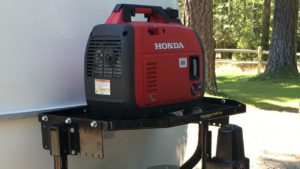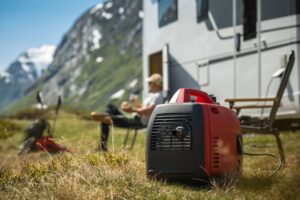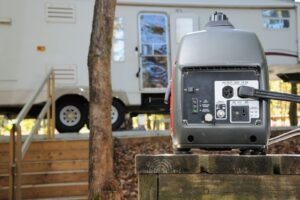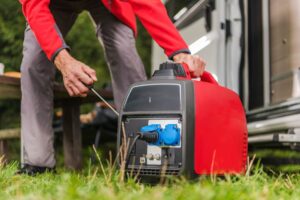Your RV generator is a lifesaver when boondocking and in any other situation where electricity is in short supply. The generator keeps your battery running and your lights on. You want to keep your generator in top condition for how often you rely on it, but how frequently do you need to service it?
You should get your RV generator professionally serviced at least once a year or every 500 hours, whichever happens first.
This guide to all things motorhome generator maintenance will talk further about the above timeframe. I’ll also discuss whether you should maintain your generator yourself, what maintenance a generator requires, and why you should prioritize this job.

How Often Should an RV Generator Be Serviced?
Servicing a motorhome generator refers to changing its oil. This will keep the generator running its best to continue serving you and your family or friends.
How often does a generator need this work? That all depends on how much you use your generator.
If you live in your motorhome full-time and rely on your generator very often, you should get into the habit of planning oil changes frequently. You might need generator servicing in as few as 50 hours or as many as 500, with an average of about 200 hours.
For those who aren’t as heavy on generator use, you can service the device when it hits 500 hours or after a year. Whichever happens first is when you should schedule the maintenance.
Professional vs. DIY RV Generator Servicing
If you’ve had an RV for long enough, you know how expensive ownership is. You’re always willing to do what it takes to save a buck, which has inspired you to look into DIY generator maintenance.
Is this feasible? What about safe or smart? Let’s explore some downsides.
Deconstruction Is a Challenge (And Not a Fun One!)
While you can maintain your generator yourself, it’s not always as easy as it seems. You can do a basic external inspection, but accessing the inside of the generator can be difficult if you need to test, repair, or replace any internal parts.
You need the exterior intact to reach the components inside, as you must put everything back together as you found it for the generator to work again.
If even one part is out of place, it won’t work!
You Could Accidentally Destroy the Generator
If you’re too heavy-handed during deconstruction, you could seriously damage or even destroy the generator.
While you might be able to handle basic repairs to a reasonable degree, there comes a point where it’s probably too much beyond your depth. At that point, you’d have no other choice but to replace the generator with a new one.
An RV generator is no small expense, as the unit can cost several hundred dollars and sometimes over $1,000. That’s not an expense you want to shell out if you don’t have to.
You Could Void the Generator’s Warranty
If you read the fine print, you’ll discover that most motorhome generators are covered under warranty. The warranty could last a year or several, but it protects against craftsmanship issues and related defects.
By going in and tinkering with your generator to repair or service it, you will more than likely void your warranty. If the warranty lasts for several years and your gen is brand-new, you’re missing out on many years of protection you could have had.
You Could Get Injured
The last reason to reconsider servicing an RV generator yourself is the risk of injury. You could end up with lacerations, broken bones, or worse, especially if you’re electrocuted.
Professional servicing from an insured, bonded, and licensed individual or team will help you avoid the above issues. You will have to spend additional money but think of all the expenses you can skip, such as new generator parts and hospital bills for any injuries incurred.
What Maintenance Does an RV Generator Need?
Are you considering doing RV generator maintenance yourself? Perhaps you’re taking your generator to a professional, but you’re wondering what they will do as part of its servicing.
Here’s a complete overview of what motorhome generator maintenance looks like.
Visual Inspection

The maintenance process always begins with a visual inspection of the generator. This is something you can easily do yourself, whether trusting your generator maintenance to a professional or doing it yourself.
It’s good to learn how to do generator inspection anyway, as making it a monthly habit could extend the life of the gen.
Begin by cleaning the generator’s exterior, wiping it down with water and mild dish soap. It’s a lot easier to see any issues once you’ve cleaned the generator.
What kind of problems are you looking for? Anything overtly visible. For example, if you see corrosion, rust, cracks, leaks, or other damage, those are all signs that something is wrong with the generator.
Rather than proceed with servicing it, you might want to think about replacing the generator, as prolonged use could be dangerous.
Check and Top Off the Oil Levels
Servicing refers to topping off oil levels, just as is the case in your motorhome or car and/or truck. However, before you get to that, you should determine whether the generator even needs more oil.
You can check the dipstick for this. The oil will naturally deplete the more often you use your generator.
If your generator needs oil, only use the type you’ve already added. Combining oils could cause unpredictable, potentially dangerous reactions. Pour in just enough oil to fill to the top, but don’t overfill.
Change the Fuel Filters
If you’ve done car or RV maintenance before, you should be familiar with the fuel filter. The filter catches fuel liquids and/or particulates to keep an internal combustion engine operational.
The engine will get bogged down quickly without fuel filters, so make it a point to check yours at least every 500 hours the generator runs.
Here’s another handy pointer. Some generators have more than one fuel filter. If that’s the case for yours, make sure you check both.
Exchange the Spark Plug
Your RV gas generator utilizes spark plugs that keep the engine running. If even one of the spark plugs fails, the engine might not turn on, leaving you without a generator.
Sometimes, up to two spark plugs can have issues before the generator stops running.
When spark plug failure happens, replacing the plugs will quickly get the generator in running order. You don’t have to worry about spark plugs if you have a diesel generator.
Swap Out the Air Filters
The air filter also needs some love. An RV generator air filter works the same way your air conditioner air filter does. That is, the filter catches airborne particulates.
Your generator works best with a clean air filter. If too much gunk gets into the filter and you don’t change it out, the generator is prone to overheating and other performance issues.
Not all generators have a replaceable air filter. You might be able to simply remove, clean, and replace it. You have no choice but to throw away single-use air filters once they get dirty enough.
In the future, check the air filter every 400 hours and clean or replace it.
Check the Battery Connection

Even if your generator is in otherwise fine condition, if it won’t connect to the batteries in your motorhome, it’s as good as useless.
Begin by inspecting your battery terminals, looking for signs of rust or corrosion. If you notice any exposed wiring between the battery bays and the generator, that’s also problematic. You might need a new battery terminal, and sometimes, you might have to replace the batteries altogether.
Begin checking the battery terminals once a month in the future.
Test the Generator
The last step of the process is testing the generator to ensure it works. Connect the generator to its traditional power source, turn it on, and see what happens.
Does the generator turn right on, or does it struggle? Is the engine making strange sounds? Does the generator overheat after a couple of minutes of use?
Hopefully, the answer to all these questions is no. However, if you’re having any issues, the generator may need repairs.
The Benefits of Servicing Your RV Generator
Servicing your RV generator can be advantageous for several reasons. Let’s take a closer look.
Increases the Generator’s Longevity

A good motorhome generator can last for anywhere from 10,000 to 25,000 hours, which is not too shabby!
However, the gen’s lifespan isn’t guaranteed. If you don’t care for yours, you probably won’t get anywhere near as much time as advertised.
By prioritizing maintenance going forward, you can enjoy many seasons and even years out of your generator, depending on how often and heavily you use it.
Make It More Efficient
Motorhome generator maintenance isn’t complex work, yet changing a few filters, replacing oil levels, and testing spark plugs can make such a world of difference in how well your generator runs.
When your generator works its best, you’ll save more money in the long run, as you’re not shelling out for frequent repairs.
Lowers Carbon Monoxide Risks
An RV generator that uses an internal combustion engine will release carbon monoxide as a byproduct of operation. Carbon monoxide has no smell or taste but can kill you in large enough concentrations.
Fortunately, RV generator servicing can reduce the rate of carbon monoxide emissions. A professional servicer will confirm that the generator releases fumes outside your motorhome rather than inside.
Finds Issues Early

Generators are prone to issues as they get older. That’s inevitable, but you don’t have to be blindsided by them. By servicing your machine, you can find problems as they arise.
A repairperson can quickly get your RV generator back in working order, as the damage won’t be as extensive as it would have been had you waited.
This also means you spend less on the repairs since they’re not as serious.
Overall, you extend the life of your generator even more.
Conclusion
You should plan to service your RV generator at least once a year or every 500 hours, whichever you reach first. If you live in your motorhome full-time, you will service this unit more frequently, but it’s always worth it.
Frequent generator maintenance enables you to catch issues as they arise, so you don’t have any nasty financial surprises later. You’ll save money and prolong your generator’s life.
When it comes to servicing your RV generator or letting a professional do it, go to the pros. It’s fine to visually inspect the gen, but jobs such as replacing oil levels and changing spark plugs are best left to the experts.
If your generator has a warranty, you’ll maintain it!
